|
Books Should Be Free Loyal Books Free Public Domain Audiobooks & eBook Downloads |
|
|
Books Should Be Free Loyal Books Free Public Domain Audiobooks & eBook Downloads |
|
Non-fiction |
|---|
|
Book type:
Sort by:
View by:
|
By: John Bunyan (1628-1688) | |
|---|---|
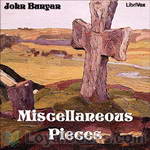 Miscellaneous Pieces
Miscellaneous Pieces
John Bunyan (November 28, 1628 – August 31, 1688), a Christian writer and preacher, was born at Harrowden (one mile south-east of Bedford), in the Parish of Elstow, England. He wrote The Pilgrim’s Progress, arguably the most famous published Christian allegory. In the Church of England he is remembered with a Lesser Festival on 30 August. Bunyan became a popular preacher as well as a prolific author, though most of his works consist of expanded sermons. In theology he was a Puritan, but there was nothing gloomy about him. The portrait his friend Robert White drew, which has often been reproduced, shows the attractiveness of his true character. | |
By: John Burroughs (1837-1921) | |
|---|---|
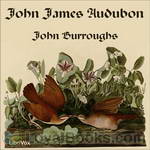 John James Audubon
John James Audubon
Audubon’s life naturally divides itself into three periods: his youth, which was on the whole a gay and happy one, and which lasted till the time of his marriage at the age of twenty-eight; his business career which followed, lasting ten or more years, and consisting mainly in getting rid of the fortune his father had left him; and his career as an ornithologist which, though attended with great hardships and privations, brought him much happiness and, long before the end, substantial pecuniary rewards. | |
 Birds and Bees, Sharp Eyes, and Other Papers
Birds and Bees, Sharp Eyes, and Other Papers
Probably no other American writer has a greater sympathy with, and a keener enjoyment of, country life in all its phases—farming, camping, fishing, walking—than has John Burroughs. His books are redolent of the soil, and have such "freshness and primal sweetness," that we need not be told that the pleasure he gets from his walks and excursions is by no means over when he steps inside his doors again. As he tells us on more than one occasion, he finds he can get much more out of his outdoor experiences by thinking them over, and writing them out afterwards... | |
By: John Clay Coleman | |
|---|---|
 Jim Crow Car; Or, Denouncement of Injustice Meted Out to the Black Race
Jim Crow Car; Or, Denouncement of Injustice Meted Out to the Black Race
"My opposition to injustice, imposition, discrimination and prejudice, which have for many years existed against the colored people of the South, has led to this little book. In many parts of America the press has been furnished with “matter” for defending the colored people, through the medium of “Coleman’s Illustrated Lectures.” By request of my many auditors, some of whom being leading elements of the Northern States and Canada, this volume is published. Many persons interested in the welfare of the negro, have sought a more elaborate book on the Southern horrors... | |
By: John Cordy Jeaffreson (1831-1901) | |
|---|---|
 A Book About Lawyers
A Book About Lawyers
| |
By: John D. Rockefeller (1839-1937) | |
|---|---|
 Random Reminiscences of Men and Events
Random Reminiscences of Men and Events
A good book by the oil revolutionist of the 20th century. As they say "Men should listen to experience" and this book is all about the experience of the second highest taxpayer of the US during the 20's. Though it is not in the book, this is a small poem he wrote:I was early taught to work as well as play,My life has been one long, happy holiday;Full of work and full of play-I dropped the worry on the way- And God was good to me everyday. | |
By: John Dewey (1859-1952) | |
|---|---|
 Democracy and Education: an introduction to the philosophy of education
Democracy and Education: an introduction to the philosophy of education
| |
 The Child and the Curriculum
The Child and the Curriculum
| |
 Moral Principles in Education
Moral Principles in Education
| |
 Human Nature And Conduct - Part 1, The Place of Habit in Conduct
Human Nature And Conduct - Part 1, The Place of Habit in Conduct
John Dewey, an early 20th Century American philosopher, psychologist, educational theorist saw Social Psychology as much a physical science as Biology and Chemistry. This project encompasses Part 1 of 4 of his book Human Nature and Conduct. Dewey's uses the word "HABIT" as a specialized catch-all word to describe how a person and his/her objective environment interact. This interaction is the basis for moral judgement. Dewey writes: "All habits are demands for certain kinds of activity; and they constitute the self.” In other places he also asserts that "Habits are Will." - Summary by William Jones, Soloist | |
By: John Donne (1572-1631) | |
|---|---|
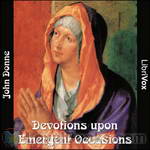 Devotions upon Emergent Occasions
Devotions upon Emergent Occasions
Devotions upon Emergent Occasions is a 1624 prose work by the English writer John Donne. It is a series of reflections that were written as Donne recovered from a serious illness, believed to be either typhus or relapsing fever. (Donne does not clearly identify the disease in his text.) The work consists of twenty-three parts describing each stage of the sickness. Each part is further divided into a Meditation, an Expostulation, and a Prayer. The seventeenth meditation is perhaps the best-known part of the work... | |
By: John E. (John Edwards) Russell (1834-1903) | |
|---|---|
 Rational Horse-Shoeing
Rational Horse-Shoeing
| |
By: John Evelyn (1620-1706) | |
|---|---|
 Sylva, Vol. 1 (of 2) Or A Discourse of Forest Trees
Sylva, Vol. 1 (of 2) Or A Discourse of Forest Trees
| |
 Acetaria: A Discourse of Sallets
Acetaria: A Discourse of Sallets
| |
By: John F. (John Fairfield) Dryden (1839-1911) | |
|---|---|
 The American Type of Isthmian Canal Speech by Hon. John Fairfield Dryden in the Senate of the United States, June 14, 1906
The American Type of Isthmian Canal Speech by Hon. John Fairfield Dryden in the Senate of the United States, June 14, 1906
| |
By: John Fiske (1842-1901) | |
|---|---|
 The Unseen World and Other Essays
The Unseen World and Other Essays
| |
By: John Franklin Bobbitt | |
|---|---|
 What the Schools Teach and Might Teach
What the Schools Teach and Might Teach
| |
By: John Galsworthy (1867-1933) | |
|---|---|
 John Galsworthy Works
John Galsworthy Works
| |
By: John George Nicolay | |
|---|---|
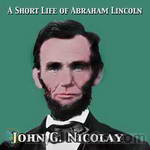 A Short Life of Abraham Lincoln
A Short Life of Abraham Lincoln
John G. Nicolay was Abraham Lincoln’s private White House secretary. With assistant secretary, John Hay, he wrote the two volume definitive biography of Lincoln, “Abraham Lincoln, a Biography.” Although this is a condensation by Nicolay of that biography, it is still a sizable work and a fairly thorough treatment of the life of the 16th president of the United States. | |
By: John Gregory Bourke (1846-1896) | |
|---|---|
 Medicine-Men Of The Apache
Medicine-Men Of The Apache
“Herewith I have the honor to submit a paper upon the paraphernalia of the medicine-men of the Apache and other tribes. Analogues have been pointed out, wherever possible, especially in the case of the hoddentin and the izze-kloth, which have never to my knowledge previously received treatment.” . Bourke was a Medal of Honor awardee in the American Civil War whose subsequent Army career included several campaigns in the Indian wars of the mid to late 19th century in the American West. He wrote prolifically... | |
By: John H. (John Henry) Worst (1850-1945) | |
|---|---|
 The Stewardship of the Soil Baccalaureate Address
The Stewardship of the Soil Baccalaureate Address
| |
 A Broader Mission for Liberal Education Baccalaureate Address, Delivered in Agricultural College Chapel, Sunday June 9, 1901
A Broader Mission for Liberal Education Baccalaureate Address, Delivered in Agricultural College Chapel, Sunday June 9, 1901
| |
By: John Henry Ingram (1842-1916) | |
|---|---|
 Claimants to Royalty
Claimants to Royalty
A compilation of chronicles of the numerous impostors and impostures of kings, queens, and rulers. | |
By: John Henry Newman (1801-1890) | |
|---|---|
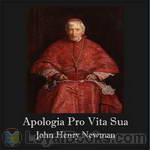 Apologia Pro Vita Sua
Apologia Pro Vita Sua
A religious autobiography of unsurpassed interest, the simple confidential tone of which "revolutionized the popular estimate of its author," establishing the strength and sincerity of the convictions which had led him into the Roman Catholic Church (Wikipedia). "No autobiography in the English language has been more read; to the nineteenth century it bears a relation not less characteristic than Boswell's 'Johnson' to the eighteenth." Rev. Wm. Barry, D.D. | |
By: John Henry Patterson (1867-1947) | |
|---|---|
 The Man-Eaters of Tsavo and Other East African Adventures
The Man-Eaters of Tsavo and Other East African Adventures
In 1898, during the construction of river-crossing bridge for the Uganda Railway at the Tsavo River, as many as 135 railway workers were attacked at night, dragged into the wilderness, and devoured by two male lions. The Man-Eaters of Tsavo is the autobiographical account of Royal Engineer Lt. Col. J.H. Patterson's African adventures. Among them, his hunt for the two man-eaters.This book was the basis for the 1996 film The Ghost and the Darkness. | |
By: John Huntley Skrine (1848-1923) | |
|---|---|
 Uppingham by the Sea a Narrative of the Year at Borth
Uppingham by the Sea a Narrative of the Year at Borth
| |
By: John Kendrick Bangs (1862-1922) | |
|---|---|
 Peeps at People - Being Certain Papers from the Writings of Anne Warrington Witherup
Peeps at People - Being Certain Papers from the Writings of Anne Warrington Witherup
Written by a fictitious first-person narrator, this book puts a humorous spin on encounters with several famous people of the time. "I set forth from my office in London upon my pilgrimage to the shrines of the world's illustrious. Readers everywhere are interested in the home life of men who have made themselves factors in art, science, letters, and history, and to these people I was commissioned to go." -- Summary by TriciaG and from the book. | |
By: John L. Cotter (1911-1999) | |
|---|---|
 New Discoveries at Jamestown
New Discoveries at Jamestown
Chances are, you are reading this because you are aware that Jamestown, Virginia, celebrated its 400th birthday in 2007. It was the first “successful” English settlement in America. Although the colonists eventually moved upriver to be quit of the hard luck and difficult conditions on the small island, they left behind a trove of possessions – used, worn out, or forgotten. Did you ever stop to consider just how many different items you have, need, or use, to live, work, and amuse yourself? Chances are that you would seriously underestimate! But once you put such a list together, another person could tell quite a story about the life you lead... | |
By: John Lancaster Spalding (1840-1916) | |
|---|---|
 Education and the Higher Life
Education and the Higher Life
| |
By: John M. (John Moseley) Weeks (1788-1858) | |
|---|---|
 A Manual or an Easy Method of Managing Bees
A Manual or an Easy Method of Managing Bees
| |
By: John Mackenzie Bacon (1846-1904) | |
|---|---|
 The Dominion of the Air; the story of aerial navigation
The Dominion of the Air; the story of aerial navigation
| |
By: John Mark | |
|---|---|
 Jesus of Nazareth, A Biography
Jesus of Nazareth, A Biography
"Jesus of Nazareth, a Biography, by John Mark," recognizes the author of the second Gospel as that "John, whose surname was Mark" (Acts 15:37), whom Barnabas chose as companion when he sailed for Cyprus on his second missionary journey. In making use of the new title, the plan of the Editor is to present "The Gospel: According to Mark" as it would be printed were it written in the twentieth rather than the first century. (Introduction from Forward, by D. Appleton & Co, Publishers, 1922) | |
By: John Marshall (1755-1835) | |
|---|---|
 Opinion of the Supreme Court of the United States, at January Term, 1832
Opinion of the Supreme Court of the United States, at January Term, 1832
| |
By: John Marshall Barker (1849-1928) | |
|---|---|
 Colleges in America
Colleges in America
| |
By: John Mills (1880-) | |
|---|---|
 Letters of a Radio-Engineer to His Son
Letters of a Radio-Engineer to His Son
| |
By: John Milton (1608-1674) | |
|---|---|
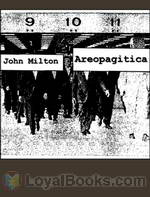 Areopagitica
Areopagitica
A prose tract or polemic by John Milton, published November 23, 1644, at the height of the English Civil War… Milton, though a supporter of the Parliament, argued forcefully against the Licensing Order of 1643, noting that such censorship had never been a part of classical Greek and Roman society. The tract is full of biblical and classical references which Milton uses to strengthen his argument. The issue was personal for Milton as he had suffered censorship himself in his efforts to publish... | |
By: John Muir (1838-1914) | |
|---|---|
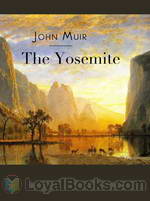 The Yosemite
The Yosemite
Anyone who's ever visited the Yosemite National Park will find this book a treasure trove of descriptions, information and evocations of the fabled beauty of this amazing piece of heaven on earth! The Yosemite by John Muir was published in 1912. Born in Scotland, England, this world-famous conservationist was a multi-talented genius. He was a geologist, naturalist, engineer, writer, botanist and a passionate and prolific writer on the preservation of the natural environment. His family migrated to America when he was just a few years old, the third of eight boisterous children... | |
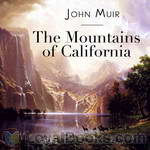 The Mountains of California
The Mountains of California
First published in 1894, this wonderful travelogue by a famed naturalist and conservationist still remains a book that delights and informs its readers. The Mountains of California by John Muir recounts the author's exploration of the Yosemite Valley, Mount Whitney, the famed sequoia forests and King's Canyon among other places of immense natural beauty. Written in his characteristic zestful style, with a deep understanding and respect for nature, the book is a treasure trove of geography, geology, botany, biology and sheer love of the magical planet we live in... | |
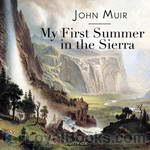 My First Summer in the Sierra
My First Summer in the Sierra
The journal of nature-lover John Muir who spent the summer of 1869 walking California’s Sierra Nevada range. From French Bar to Mono Lake and the Yosemite Valley, Muir was awestruck by everything he saw. The antics of the smallest “insect people” amazed him as much as stunted thousand-year old Juniper trees growing with inconceivable tenacity from tiny cracks in the stone. Muir spent the rest of his life working to preserve the high Sierra, believing that “the clearest way into the Universe is through a forest wilderness.” John Muir (1838-1914) was born in Dunbar, Scotland and grew up in Wisconsin, USA. This recording commemorates the 140th anniversary of that first summer. | |
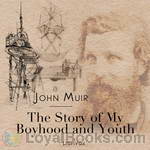 The Story of My Boyhood and Youth
The Story of My Boyhood and Youth
“The only fire for the whole house was the kitchen stove, with a fire box about eighteen inches long and eight inches wide and deep,- scant space for three or four small sticks, around which in hard zero weather all the family of ten shivered, and beneath which in the morning we found our socks and coarse, soggy boots frozen solid.” Thus, with perceptive eye for detail, the American naturalist, John Muir, describes life on a pioneer Wisconsin farm in the 1850’s. Muir was only eleven years old when his father uprooted the family from a relatively comfortable life in Dunbar, Scotland, to settle in the backwoods of North America... | |
 Travels in Alaska
Travels in Alaska
In 1879 John Muir went to Alaska for the first time. Its stupendous living glaciers aroused his unbounded interest, for they enabled him to verify his theories of glacial action. Again and again he returned to this continental laboratory of landscapes. The greatest of the tide-water glaciers appropriately commemorates his name. Upon this book of Alaska travels, all but finished before his unforeseen departure, John Muir expended the last months of his life. | |
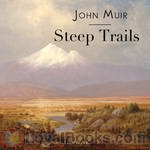 Steep Trails
Steep Trails
A collection of Muir's previously unpublished essays, released shortly after his death. "This volume will meet, in every way, the high expectations of Muir's readers. The recital of his experiences during a stormy night on the summit of Mount Shasta will take rank among the most thrilling of his records of adventure. His observations on the dead towns of Nevada, and on the Indians gathering their harvest of pine nuts, recall a phase of Western life that has left few traces in American literature... | |
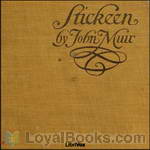 Stickeen
Stickeen
A great dog story, a well told tale — the naturalist and adventurer John Muir recounts how he and his companion, a dog named Stickeen, each, alone, confronted and conquered their fears of an icy Alaskan glacier in 1880. | |
By: John Munro (1849-1930) | |
|---|---|
 The Story of Electricity
The Story of Electricity
In the book's preface, the author writes: "Let anyone stop to consider how he individually would be affected if all electrical service were suddenly to cease, and he cannot fail to appreciate the claims of electricity to attentive study."In these days when we take for granted all kinds of technology - communications, entertainment, medical, military, industrial and domestic - it is interesting to learn what progress had been made in the fields of electricity and technology by the beginning of the 20th century... | |
 Heroes of the Telegraph
Heroes of the Telegraph
| |
By: John N. (John Nathan) Cobb (1868-1930) | |
|---|---|
 The Lobster Fishery of Maine Bulletin of the United States Fish Commission, Vol. 19, Pages 241-265, 1899
The Lobster Fishery of Maine Bulletin of the United States Fish Commission, Vol. 19, Pages 241-265, 1899
| |
By: John Parker Headley | |
|---|---|
 How to Make a Shoe
How to Make a Shoe
| |
By: John R. Hale | |
|---|---|
 Famous Sea Fights
Famous Sea Fights
I propose to tell in non-technical and popular language the story of some of the most remarkable episodes in the history of sea power. I shall begin with the first sea-fight of which we have a detailed history—the Battle of Salamis (B.C. 480), the victory by which Themistocles the Athenian proved the soundness of his maxim that “he who commands the sea commands all.” I shall end with the last and greatest of naval engagements, the Battle of Tsu-shima, an event that reversed the long experience of victory won by West over East, which began with Salamis more than two thousand years ago... | |
By: John R. Lynch (1847-1939) | |
|---|---|
 The Facts of Reconstruction
The Facts of Reconstruction
After the American Civil War, John R. Lynch, who had been a slave in Mississippi, began his political career in 1869 by first becoming Justice of the Peace, and then Mississippi State Representative. He was only 26 when he was elected to the US Congress in 1873. There, he continued to be an activist, introducing many bills and arguing on their behalf. Perhaps his greatest effort was in the long debate supporting the Civil Rights Act of 1875 to ban discrimination in public accommodations.In 1884 Lynch was the first African American nominated after a moving speech by Theodore Roosevelt to the position of Temporary Chairman of the Republican National Convention in Chicago, Illinois... | |
By: John Reed (1887-1920) | |
|---|---|
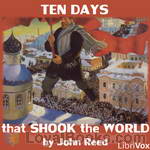 Ten Days that Shook the World
Ten Days that Shook the World
Ten Days that Shook the World (1919) is a book by American journalist and socialist John Reed about the October Revolution in Russia in 1917 which Reed experienced firsthand. Reed followed many of the prominent Bolshevik leaders, especially Grigory Zinoviev and Karl Radek, closely during his time in Russia.John Reed died in 1920, shortly after the book was finished, and he is one of the few Americans buried at the Kremlin Wall Necropolis in Moscow, a site normally reserved only for the most prominent Soviet leaders... | |
By: John Ruskin (1819-1900) | |
|---|---|
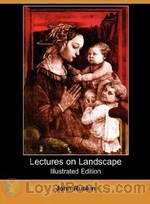 Lectures on Landscape
Lectures on Landscape
A series of lectures on landscape painting delivered at Oxford in 1871, by artist, critic, and social commentator, John Ruskin. | |
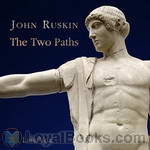 The Two Paths
The Two Paths
"The Two Paths" is a collection of five lectures delivered in 1858 and 1859 by John Ruskin on art and architecture. This is how the author himself presents the book: "The following addresses, though spoken at different times, are intentionally connected in subject; their aim being to set one or two main principles of art in simple light before the general student, and to indicate their practical bearing on modern design. The law which it has been my effort chiefly to illustrate is the dependence of all noble design, in any kind, on the sculpture or painting of Organic Form." The most famous of these, the fifth lecture, is commonly known simply as "The Work of Iron" | |
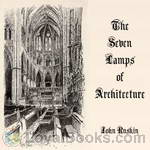 The Seven Lamps of Architecture
The Seven Lamps of Architecture
The Seven Lamps of Architecture, published in May 1849, is an extended essay written by the English art critic and theorist John Ruskin. The 'lamps' of the title are Ruskin's principles of architecture, which he later enlarged upon in the three-volume The Stones of Venice. To an extent, they codified some of the contemporary thinking behind the Gothic Revival. At the time of its publication A.W.N. Pugin and others had already advanced the ideas of the Revival and it was well under way in practice... | |
 The Stones of Venice, volume 1
The Stones of Venice, volume 1
The Stones of Venice is a three-volume treatise on Venetian art and architecture by English art historian John Ruskin, first published from 1851 to 1853. Intending to prove how the architecture in Venice exemplified the principles he discussed in his earlier work, The Seven Lamps of Architecture, Ruskin examined the city in detail, describing for example over eighty churches. He discusses architecture of Venice's Byzantine, Gothic and Renaissance periods, and provides a general history of the city as well... | |
 Sesame and Lilies
Sesame and Lilies
Sesame and Lilies proposes and answers the questions, how, what and why to read in the context of how and why to live. About earlier and later editions of the book containing the first two lectures alone, Ruskin wrote: "...chiefly written for young people belonging to the upper or undistressed, middle classes; who may be supposed to have choice of the objects and command of the industries of their life... if read in connection with “Unto This Last” it contains the chief truths I have endeavored through all of my past life to display… and am chiefly thankful to have learned and taught... | |
By: John S. (John Shertzer) Hittell (1825-1901) | |
|---|---|
 Hittel on Gold Mines and Mining
Hittel on Gold Mines and Mining
| |
By: John S. C. Abbott (1805-1877) | |
|---|---|
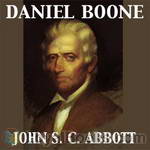 Daniel Boone
Daniel Boone
This is a detailed biography of the life and adventures of Daniel Boone. His accomplishments are brushed over in history classes these days and not given the recognition they deserve. This biography clearly paints a picture of the benevolent person of Daniel Boone as well as the achievements he made in furthering European settlement in America. | |
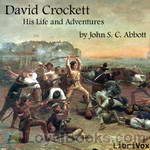 David Crockett: His Life and Adventures
David Crockett: His Life and Adventures
David "Davy" Crockett (August 17, 1786 – March 6, 1836) was a celebrated 19th century American folk hero, frontiersman, soldier and politician. He is commonly referred to in popular culture by the epithet “King of the Wild Frontier.” He represented Tennessee in the U.S. House of Representatives, served in the Texas Revolution, and died at the Battle of the Alamo. This narrative attempts faithfully to record the influences under which David Crockett was reared and the incidents of his wild and wondrous life... | |